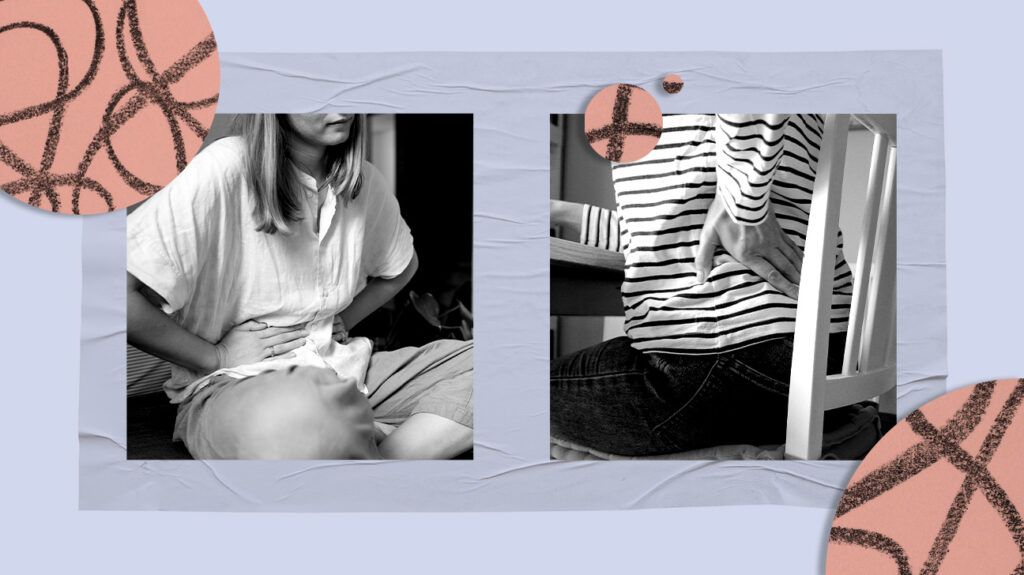Various conditions can cause pain in the abdomen and back. These include menstrual pain, endometriosis, kidney stones, and pancreatitis. More serious causes include a kidney infection or appendicitis.
Many causes of abdomen and back pain are not emergencies, but some require prompt treatment.
If the pain comes on suddenly, is severe, gets progressively worse, or occurs with other symptoms, such as nausea or a fever, a person should seek medical attention right away.
In this article, learn about some potential causes of pain in the abdomen and back.

Possible causes of pain in the abdomen and back include:
Abdomen and back pain are also potential symptoms of a heart attack.
- pain in the chest, stomach, back, arms, neck, or jaw
- sweating
- dizziness
- fatigue
- nausea or vomiting
- shortness of breath
- anxiety
A person who has pain in their back and abdomen should seek immediate help if any of the following apply:
- They have symptoms that suggest a heart attack, as listed above.
- The pain begins suddenly, is severe, or does not respond to pain medication.
- The pain is getting progressively worse.
- The pain begins after an injury.
- There is swelling and tenderness in the abdomen.
- They also have nausea, vomiting, or a fever.
The following sections look at some of the causes of abdomen and back pain in more detail.
Menstrual pain, or dysmenorrhea, occurs before or during menstruation. It results from an overproduction of prostaglandins. These are lipids, or fats, that act similarly to hormones.
The pain may be:
- cramping
- throbbing
- dull and achy
For some people, the pain radiates to the lower back.
People may also experience:
- mood changes
- fatigue
- nausea
Over-the-counter (OTC) nonsteroidal anti-inflammatory drugs (NSAIDs), such as ibuprofen, can often help manage period pain.
However, if the symptoms are severe and interfere with daily activities, a person should speak with a doctor.
Symptoms they should investigate include:
- heavy bleeding
- blood clots in menstrual flow that are bigger than a quarter
- pain, bleeding, or both between periods
Endometriosis occurs when tissue that is similar to the lining of the uterus grows elsewhere, causing pain and heavy periods.
Other symptoms include:
- chronic back or pelvic pain
- pain when urinating or during bowel movements
- pain during or after sex
- bleeding or spotting between periods
- digestive symptoms
- difficulty getting pregnant
In the United States, endometriosis affects
Treatment can vary depending on the severity of the symptoms and whether the person wants to get pregnant.
Pain medication is an option for many. Those who do not wish to conceive may also benefit from hormonal birth control options that reduce or stop periods. Those who do want to get pregnant may take gonadotropin-releasing hormone agonists. These drugs temporarily stop ovulation and shrink the tissue, which may make conception possible when the person stops taking them.
In severe cases, surgery may be necessary to remove endometriosis tissue.
Kidney stones
Kidney stones can cause a sharp pain in the:
- back
- side
- lower abdomen
- groin
The pain may come and go in waves and last for a long or short time.
Other symptoms of kidney stones include:
- nausea
- vomiting
- fever and chills
Some stones pass through the urinary tract without medical intervention. A doctor may recommend drinking plenty of water to help the stones pass and taking OTC NSAIDs to manage the pain.
Some people may need minor surgery to break up the stones so that they can pass.
A kidney infection is a potentially serious bacterial infection. It
Like kidney stones, a kidney infection can cause pain in the:
- lower back
- side
- groin
Other symptoms may include:
- fever and chills
- nausea, vomiting, or both
- cloudy, dark, or foul-smelling urine
- blood in the urine
- painful, frequent urination
People aged 65 years and over may not have these symptoms. Instead, they may experience:
- difficulty thinking
- confusion
- hallucinations
- unclear speech
Infants under 2 years old may only have a high fever.
A kidney infection is a serious condition. It needs immediate treatment to prevent complications such as sepsis. Treatment is usually with antibiotics.
Pancreatitis is inflammation of the pancreas. It can result from gallstones, a high alcohol intake, some medications, genetics, infections, and other causes.
Most people with pancreatitis experience pain, which may:
- be in the upper abdomen
- spread to the back
- worsen after meals
The pain may become constant and severe, but it could disappear as pancreatitis gets worse. Some people experience no pain at all.
Other symptoms of pancreatitis can include:
- diarrhea or greasy, foul-smelling stools
- nausea, vomiting, or both
- weight loss
Pancreatitis can be acute or chronic. Acute pancreatitis appears suddenly. Chronic pancreatitis develops slowly and may be present for a long time without symptoms. With chronic pancreatitis, when a person finds out that they have it, complications have usually already begun.
Treatment options for pancreatitis include antibiotics, rehydration fluids, vitamin supplements, and, in some cases, surgery.
Pain in the abdomen and back can occur with various conditions.
Symptoms sometimes result from a temporary condition, such as dysmenorrhea or mild kidney stones. People can often treat these conditions with OTC pain relief.
However, some conditions need medical treatment as soon as possible. These include kidney infections, appendicitis, and heart attacks. A person should seek help at once if they experience any severe or concerning symptoms.


